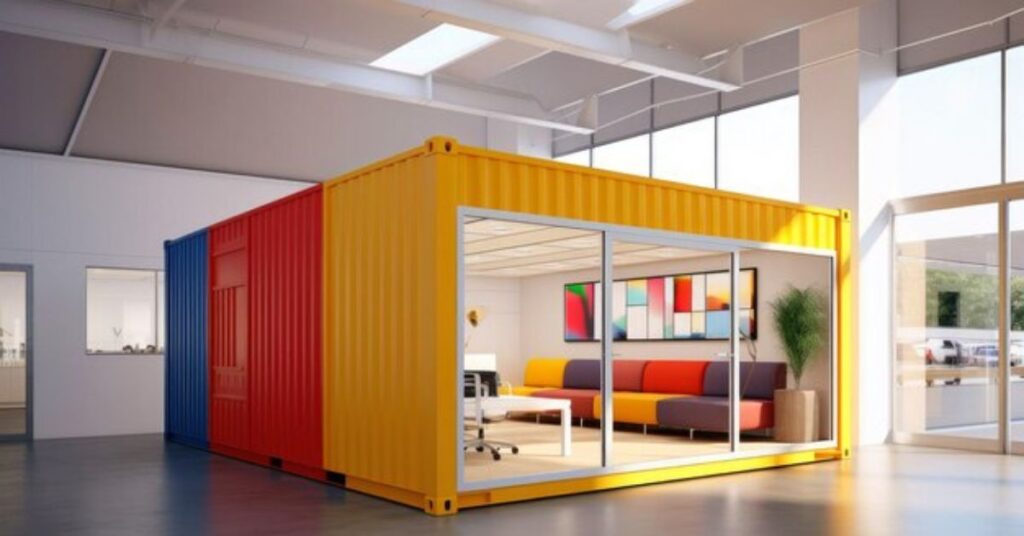Introduction to Mobile Offices
The emergence of shipping container offices redefines workplace solutions, providing a distinctive alternative to conventional office spaces that traditionally rely on permanent structures. These modular constructs are not just placeholders but are increasingly becoming a staple in modern architecture due to their split functionality and aesthetic appeal. Offering more than just a temporary shelter, they create dynamic workspace environments that align with the evolving needs and aspirations of the modern workforce.
Benefits of Shipping Container Offices
Shipping container offices are synonymous with flexibility and adaptability, which makes them exceptional solutions for enterprises juggling multiple project sites or needing temporary infrastructure. Traditional office environments necessitate extensive planning and significant investment in materials and manpower—a process that can stretch over several months or even years. Shipping container offices, by contrast, can be set up within a drastically shortened time frame, often within days, providing immediate workspace solutions where needed most.
The ease with which these offices can be relocated is another crucial advantage. This mobility reduces the logistical complexities inherent in traditional office relocations, enabling businesses to redirect operations and resources seamlessly. Companies can quickly adapt to market fluctuations or project demands without the time-consuming and costly procedures of moving conventional office setups. Furthermore, their inherent durability allows a shipping container office to withstand various environmental challenges, providing a reliable workspace solution in diverse climates and locations. This flexibility in use and location supports current business operations and future-proofs against shifts in market demands, allowing for smooth transitions between different projects.
Design Flexibility and Customization
The design superiority of shipping container offices emerges from their inherent modularity, which facilitates a wide range of configurations that can be tailored according to specific aesthetic and functional demands. As highlighted by ArchDaily, these offices empower architects and designers to push creative boundaries while maintaining functionality. This adaptability allows them to create environments that boost productivity and support collaborative innovations, allowing businesses to craft unique workspaces that reflect their brand identity and operational requirements.
Integrating essential utilities like electricity, plumbing, and advanced technology turns these seemingly industrial spaces into hubs of modern convenience. Furthermore, these structures can incorporate eco-friendly features such as solar panels, rainwater harvesting systems, and energy-efficient lighting. This blend of sustainability and customization ensures that the space is attractive and functional and aligned with broader environmental and social governance goals. Additionally, the potential for future expansion is inherent in container designs, providing unique opportunities for growth and adaptation without uprooting established spaces.
Sustainable Solutions
In the face of environmental challenges and the urgent need for sustainable development, shipping container offices provide an innovative approach to minimizing ecological footprints. They repurpose retired containers, indulging in an eco-friendly lifecycle that would otherwise contribute to global waste. Far from decommissioned shipping containers merely serving a secondary purpose, their transformation into offices underscores a commitment to resource reuse—a cornerstone in the broader sustainability narrative.
This upcycling process not only diverts waste from landfills but also demonstrates a tangible commitment to corporate social responsibility (CSR). Organizations opting for container offices are actively participating in reducing their carbon footprints while setting precedents for others to follow, thereby championing a culture of sustainability. Moreover, the sustainable construction methodologies employed in customizing these containers support energy conservation, enabling businesses to effectively meet environmental standards and bolster their CSR initiatives. Such moves resonate well with environmentally-conscious investors and clients alike, enhancing corporate reputation while fulfilling stakeholder expectations regarding eco-responsibility.
Economic Efficiency of Container Offices
The economic incentives of converting shipping containers into offices can substantially impact a company’s bottom line, as these modular spaces frequently prove more cost-effective than traditional alternatives. The savings begin with lower construction costs, as these offices eliminate the need for foundational construction and related expenditures. The quick turnaround from concept to completion also diminishes labor expenses, making them a financially astute choice for startups and established enterprises.
Beyond initial setup cost reductions, container offices allow businesses to custom design interiors with high-quality, sustainable materials, ensuring that quality is never compromised. Businesses can channel funds into other growth-focused initiatives by optimizing the financial resources allocated to setting up these offices. Furthermore, businesses can achieve long-term operational savings through energy-efficient installations like solar panels and optimal natural lighting, which help reduce utility costs over time. This combination of immediate and long-term financial benefits demonstrates the economic prudence of adopting shipping container offices as a strategic investment in operational efficiency and fiscal responsibility.
Future Trends in Mobile Office Workspaces
The forward-looking trajectory of shipping container offices indicates a trend toward even greater innovation as developments in smart technologies and materials continue to evolve. Future iterations of these offices might include advanced features like automated climate control systems that optimize energy use or intelligent noise cancellation setups that enhance office ambiance and productivity. Such technological integrations align with the demands of a rapidly changing work environment where flexibility and comfort are paramount.
The shift towards hybrid work models, where employees alternate between remote and in-office work, will likely increase demand for adaptable spaces that accommodate frequent changes in working patterns. Consequently, shipping container offices are positioned to play a critical role in shaping the future workplace, offering flexible and efficient solutions to support modern enterprises’ dynamic needs while maintaining sustainable practices.
Challenges and Considerations
Despite the myriad advantages of shipping container offices, potential users must be cognizant of the challenges associated with their deployment. Compliance with local building codes and zoning laws requires meticulous planning and a deep understanding of applicable regulations, necessitating consultation with experts in this niche field. This might involve ensuring that container modifications meet national and international safety standards, particularly regarding structural integrity, insulation, and fire safety.
Another significant consideration is maintaining these spaces’ thermal comfort and insulation properties. While the base materials of shipping containers are robust, their metal walls can lead to significant heat gain or loss, depending on the external environment. Effective solutions include installing high-quality insulation materials and climate control systems to mitigate these effects.







